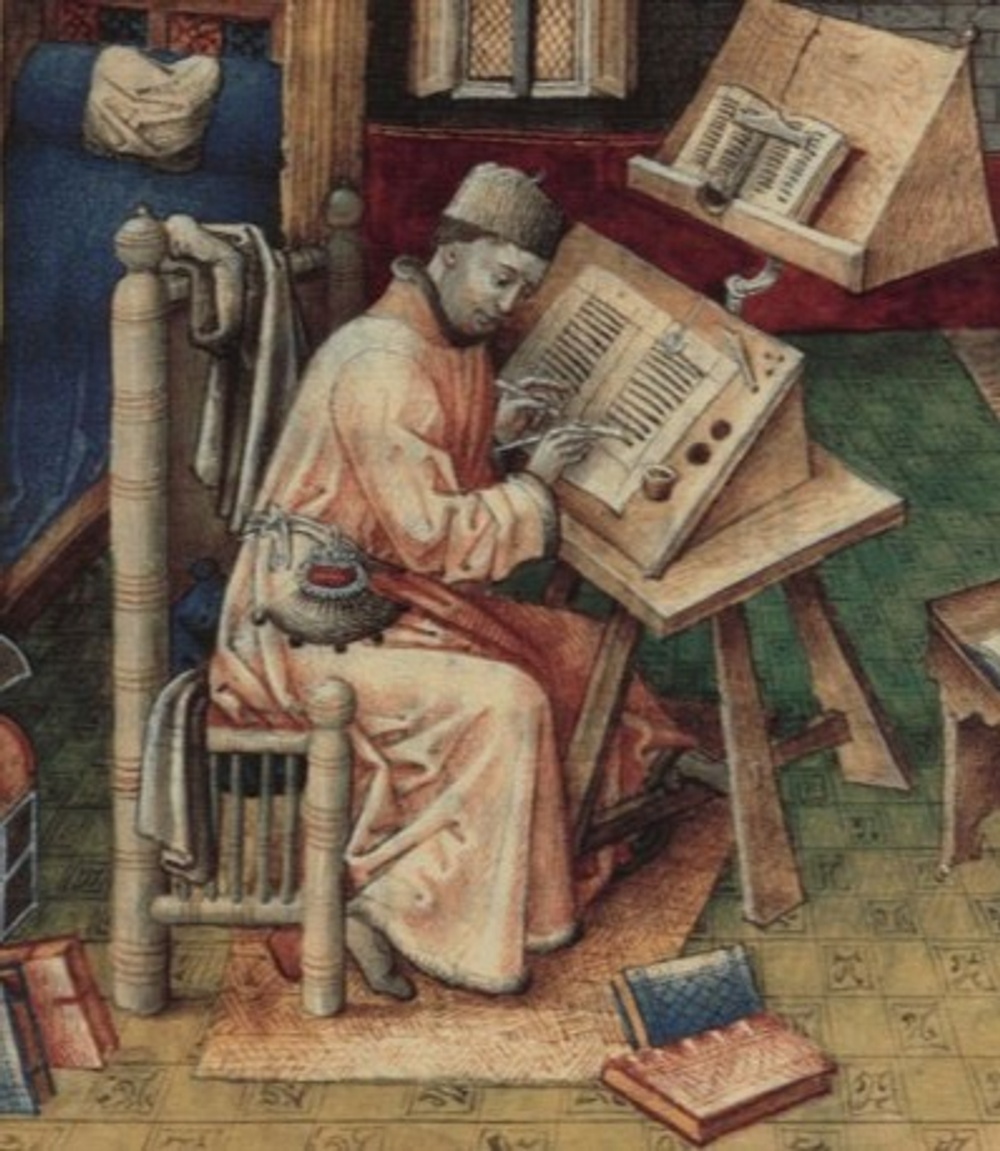Masters and Servants – The History of Company Roles
Like the position of Lord Mayor and the Remembrancer, many job roles at Tallow Chandlers Hall have existed for hundreds of years. Here you will find information about the historic roles of the Master, the Clerk and the Beadle in detail, from the Company’s Medieval origins, to the present day.
The role of Clerk began during the Middle Ages when livery companies allied themselves with Catholic fraternities. In the case of the Tallow Chandlers, this was the Fraternity of John the Baptist, whose head is depicted twice on the Company’s coat of arms. These fraternities would have a resident cleric (shortened to ‘Clerk,’) who was not only responsible for spiritual matters, but for the administration of the Company. In a time when most of the population received no formal education, members of the clergy became invaluable for managing the legal and financial affairs of businesses.
After the Reformation, Catholic fraternities were disbanded. However, the Company continued to employ a clerk to administrate their affairs.
The first Clerk on record was William Wylds, who served from 1530. While there have been over 500 recorded Masters since incorporation, there have been just 28 recorded Clerks, making for an average of a 19-year term per Clerk. To date, the shortest term for a Clerk was just under a year in 1688.
The longest term has been that of Randall H. Monier-Williams, who served for 50 years between 1928 and 1978. R.H. Monier-Williams has the distinction of being just one of four Clerks who later went on to become Master of the company. In addition to his duties as Clerk, R.H. Monier-Williams was also an avid historian who wrote several books on the history of the Company.


Before the tallow candle makers of London joined together to form a livery company, the term ‘master’ was used to describe senior craftsmen who were responsible for training and managing apprentices to the trade. Early records of the company refer to the ‘Masters’ of the Tallow Chandlers’ Company, suggesting that there were multiple Tallow Chandlers with the title ‘Master’.
As the Company grew and became responsible for administering tallow trade in the City, the Company adopted a single Master, with senior Chandlers becoming Wardens or Assistants. By this time, the Master was not only responsible for passing on his knowledge and skills but also acted as an envoy for the company in City trade and politics.
Early Masters tended to serve much longer terms, with one Thomas Sewalle, serving a total of 14 years between 1481-1495. Masters also served multiple terms in the early years of the Company, often returning for a second or third year as Master.
Over the course of the Company’s history, four Masters of the Tallow Chandlers Company have gone on to become the Lord Mayor of London. One of these was Warren Stormes Hale, a social reformer who played a significant role in the founding of the City of London Boy’s School.


The title ‘Beadle’ comes from the Old English word ‘bydel,’ meaning ‘herald,’ suggesting that the original role of the Beadle was to announce guests, communicate messages and recite proclamations. Like the title of ‘Master’, the title of ‘Beadle’ would have originally been given to several members of staff in the Hall, before shifting towards describing one senior person responsible for Hall management and overseeing events.
Early Beadles would have also helped members with their duties to the City, such as participating in searches to find and destroy inferior tallow products.


Several mentions of a particularly troublesome Beadle come up in the court minutes of 1773. The Beadle, Mr. Thomas Payne, was summoned before the Court after he absconded with two guineas given to him by the Clerk, along with a large quantity of silver and plate.
When he failed to turn up to the court summons, Mr. Payne’s wife was called before the Court. However, it soon became evident that the poor woman knew nothing about her husband’s thievery, and she was sent away with half a guinea due to her ‘extreme poverty’. No further mention of Mr. Payne is made, although later court records indicate that the stolen goods were recovered.
In contrast to the larcenous Mr. Payne, John Poole, who was Beadle from 1929-1953 showed a huge amount of diligence and resourcefulness to keep the company events running during WWII.
During rationing, Poole managed to set up many deals between himself and other traders in the City using resources from the company stores as currency. Such trades included exchanging coffee for oysters and salmon, and the chickens Mr. and Mrs. Poole raised at their home for wine. Eggs also served as useful bribes during rationing, resulting in Mr. and Mrs. Poole keeping around 200 hens which were fed using scraps from meals at the Hall.

.png)
